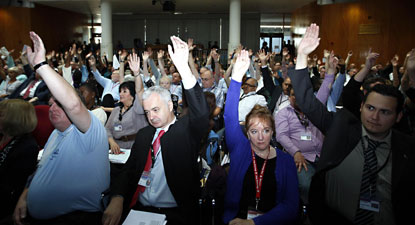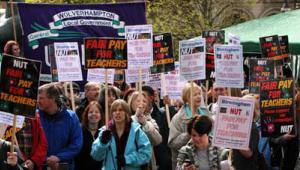By Richard Johnstone | 14 September 2011
The three biggest unions in the UK have announced plans for a co-ordinated round of industrial action in November against the government’s public sector pension changes.

Unison, Unite and
the GMB unions today said they would ballot workers for strikes this autumn,
with one union indicating that action could be planned for almost a year. November 30 has been confirmed as the first day of collective action.
This means more than 1.5 million public sector workers could walk out over the pension changes.
Ministers want to: increase employee contributions by an average of 3.2 percentage points by 2014/15; increase the retirement age; and change final salary schemes to career average defined benefit ones.
The announcement of the ballots follows a vote at the Trades Union Congress’ annual conference today, which backed plans for ‘co-ordinated industrial action’.
Unison general secretary Dave Prentis heralded the start of the action in the debate, when he revealed that he was giving 9,000 employers formal notice that his union's 1.1 million members would be balloted.
He told the TUC conference that unions had ‘had enough’ and were braced for ‘the fight of our lives’.
‘We've been patient, we've co-operated. But there comes a time when we say enough is enough. If we don't say it now, they [the government] will be back for more and more and more again.’
Announcing a ballot of 250,000 NHS, local and central government and higher and further education workers,Unite general secretary Len McCluskey said that the step was being taken ‘with reluctance, but we have been faced with a government that refuses to negotiate in good faith’.
He added: ‘Public sector workers, many of them lowly paid, are being relentlessly and unfairly targeted by the government. With their retirement incomes under threat, they have been pushed into a corner and are being forced to take this action.’
The GMB’s national secretary for public services, Brian Strutton, said that the co-ordinated action by unions would not be ‘about a day out and a bit of a protest’ as he announced the move to ballot 300,000 members. These include people employed by local councils, private contractors working in the public sector and members employed in prisons, the civil service and further and higher education.
He said: ‘We're talking about something that's long and hard and dirty as well, because this is going to require days of action running through the winter, through into next year, following the government's legislative programme right into the summer.’
The Public and Commercial Services union, which is among three civil service unions that have already announced moves towards strike action, welcomed the move.
General secretary Mark Serwotka said it showed that opposition was growing ‘to the government's raid on public sector pensions’.
He said: ‘Following the hugely successful strike by civil servants, teachers and lecturers in June, there is a clear momentum behind our campaign that ministers cannot ignore or dismiss, and they must now enter into serious and open negotiations.’
A Cabinet Office spokesman said that the government remained ‘committed to keeping public service pensions among the best available’, but needed to address rising costs due to increased longevity.
He added: ‘It is very disappointing that there have been calls for industrial action while these talks are ongoing because we hope agreement can be reached. We hope the unions will recognise that rational discussion and open dialogue are more appropriate methods of reaching a solution that works to the benefit of all, rather than engaging in industrial action.’





















